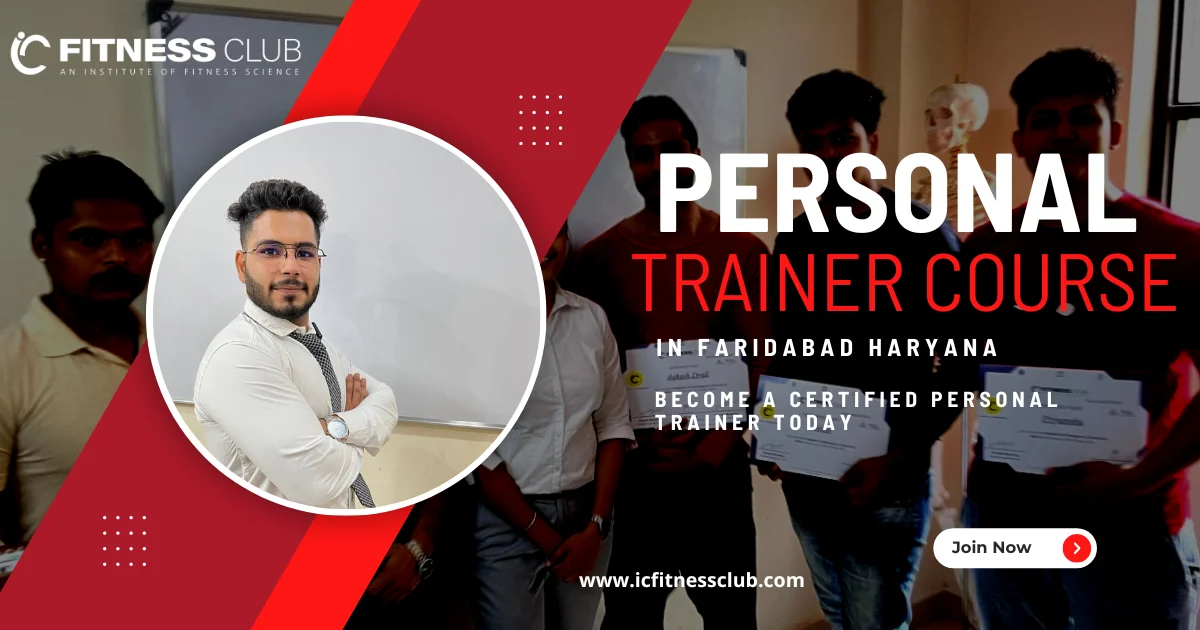Personal Trainer Course in Faridabad Haryana – IC Fitness Club
A personal trainer course is a program that provides education and training for individuals who want to become certified personal trainers. These courses typically cover topics such as exercise science, anatomy and physiology, nutrition, client assessment, program design, and client communication.
Becoming a certified personal trainer can open up many career opportunities, including working in gyms and fitness centers, providing in-home training services, and even starting your own personal training business. However, it’s important to note that certification requirements and regulations can vary by state and country, so it’s important to research and understand the requirements in your area before pursuing a personal trainer course.
Topics Covered in Personal Trainer Course
Sample syllabus that covers some of the key areas typically included in a personal trainer course:
- Anatomy and Physiology: Students will learn the basic anatomy and physiology of the human body, including the skeletal, muscular, cardiovascular, respiratory, and nervous systems.
- Exercise Science: Students will learn the principles of exercise science, including the different types of exercise (aerobic, anaerobic, resistance, etc.), how to measure and assess fitness levels, and how to develop safe and effective exercise programs.
- Nutrition: Students will learn the basics of nutrition, including macronutrients (carbohydrates, proteins, and fats), micronutrients (vitamins and minerals), and how to develop nutrition plans to support clients’ fitness goals.
- Client Assessment: Students will learn how to assess clients’ fitness levels, including conducting fitness tests, taking measurements, and gathering information on clients’ medical histories and exercise habits.
- Program Design: Students will learn how to design customized exercise programs based on clients’ goals, fitness levels, and any health or medical concerns.
- Exercise Techniques: Students will learn proper exercise techniques for a variety of exercises and equipment, and how to ensure clients use proper form to avoid injury.
- Communication and Motivation: Students will learn how to communicate effectively with clients, build rapport, and motivate clients to stay committed to their fitness goals.
- Business and Marketing: Students may learn about the business and marketing side of personal training, including how to start and run a successful personal training business.
Requirements to become a personal trainer
General requirements to become a certified personal trainer
- Age: Most certification programs require that candidates be at least 18 years old.
- Education: A high school diploma or equivalent is typically required to become a personal trainer. Some certification programs may also require a college degree in a related field, such as exercise science or kinesiology.
- CPR and AED Certification: IC Personal Trainer Course includes First Aid and CPR course which is essential to become eligible to take IC’s Exam.
- Fitness Knowledge and Experience: While not always a requirement, it is helpful to have a background or experience in fitness or athletics. Some certification programs may require candidates to have a certain level of fitness knowledge and experience before taking the certification exam.
- Pass a Certification Exam: Candidates must pass IC’s certification exam to become certified personal trainer. The exam typically includes theoretical, viva, and practical components that test the candidate’s knowledge and ability to apply it in real-life situations.
Why choose Fitness Industry?
There are several reasons why someone might choose to pursue a career in the fitness industry. Here are a few possible reasons:
- Passion for health and fitness: Some people are naturally drawn to exercise, nutrition, and wellness, and want to turn their passion into a career.
- Desire to help others: Many people who work in the fitness industry enjoy helping others achieve their fitness goals, whether that means losing weight, gaining muscle, improving their athletic performance, or simply feeling better about themselves.
- Flexibility: The fitness industry offers a lot of flexibility in terms of scheduling and work locations. Fitness professionals can work in a variety of settings, including gyms, health clubs, corporate wellness programs, and private training studios.
- Growing industry: With an increasing emphasis on health and wellness, the fitness industry is expected to continue growing in the coming years, which means there will be more job opportunities for fitness professionals.
- Entrepreneurial opportunities: Many fitness professionals have the opportunity to start their own businesses, whether that means opening a gym or starting a personal training business.
to get further details, you can visit below





